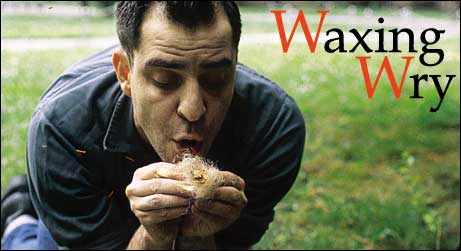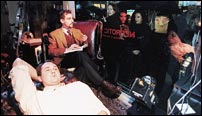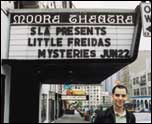 |
 |
 |
 |
|
FEATURE In the past year, David Rakoff '86 has written a book, been on the bill at Central Park's Summer Stage, appeared on The Late Show with David Letterman and The Daily Show with Jon Stewart, and won many an ear for his apt observations about everything from what it was like to play Freud in a Christmas window to why he can't stand Robin Williams. Add in rave reviews for his debut collection of essays called Fraud (Doubleday, June 2001) and the 36-year-old gay Jewish Canadian appears to have, well, made it. Public radio devotees likely are already familiar with Rakoff's alternately hilarious and melancholy, always dry-witted, deadpan voice from his role as a regular contributor to This American Life, the popular Public Radio International weekend show hosted by Ira Glass. Rakoff got his journalistic start traipsing around with a microphone interviewing people, gathering sound and broadening his deft findings with gently precise and wrenchingly funny analysis of the ironies in American culture. On the radio, and in his written work for publications like The New York Times Magazine, Outside and GQ, Rakoff excels at providing a fresh eye on people's quirks, tackling subjects as varied as country singer Shania Twain, Icelandic folklore and the Aspen comedy festival. Rakoff has taken that signature voice to the page, compiling many of his unique non-fiction essays — either culled from radio shows or magazine assignments — into his teasingly titled collection, which ends with this coy disclaimer: "I only half believe what I'm telling you." But self-incriminating and tirelessly indiscriminate with his curiosity, Rakoff makes believers out of his readers. With Fraud, Rakoff joins a growing group of young, literary, pop culture-savvy genre-benders like Glass, author Dave Eggers, humorist David Sedaris and essayist and critic Sarah Vowell, all of whom have contributed glowing quotes to Rakoff's book jacket. Almost immediately after the publication of Fraud, Rakoff found himself launched into the literary spotlight: one to watch for, as Entertainment Weekly described him. One didn't have to watch very hard, as Barnes & Noble planted his books on prominent display in the front of its stores across the country.
Rakoff's path from Kent Hall's East Asian Studies classrooms to Central Park's Summer Stage for Canada Day this summer, where he shared a spot with the folk rock band Cowboy Junkies, followed a route most humanities majors (before and since) only dream of. Ask him to recount his story, however, and he'll display the same devilish wit and vocal ease he's honed on the radio, modestly and earnestly claiming himself a beneficiary, or victim, of luck. "I was green," he says, laughingly telling of his first days at Columbia. "I had never heard of Princeton. I had fallen off the banana truck the day before." The young boy from Toronto originally selected Columbia over free universities in Canada mainly for the opportunity to head to the big city; a close second draw, he says, was the core curriculum. "I come from a decidedly pragmatic family," he says, adding that studying art or theatre was vetoed by his psychiatrist father and psychotherapist family practitioner mother. But once at Columbia, fate intervened and Rakoff assumed his natural spot on the stage, taking part in the Varsity Show and plays at Barnard's Minor Latham Playhouse. As for his decision to major in East Asian Studies, it was, he says, based simply on one requirement: "I wanted to choose a major wherein I could learn four languages." His hunger to familiarize himself with various forms of communication — which includes exploring the nuances of English — is clearly evident in even the most casual conversation, as he playfully chews on his words and savors their subtleties. "I'm a dilettante, in the best sense of the word — which is something Columbia taught me," he explains. Describing an enticingly dark aesthetic of Morningside Heights in the 1980s, Rakoff riffs: "At least when I was there you were nothing if you weren't smoking in a second-hand, black overcoat. It was de rigueur. In that sense it was quite interesting. It wore its alienation on its sleeve in the most maarrvelous way for a 17-year-old… I wasn't that cool, sadly. I wished I had been — polymorphous, febrile, sexually adventurous and difficult." While Rakoff admits to coveting the certain brand of disheveled chic, the alienation he identified in the University apparently had an effect on his work. Many of Fraud's essays center around the theme of alienation, of his being an "other." That sentiment, he says, was incubated at Columbia, along with his insatiable curiosity. Following graduation in 1986, Rakoff headed to Tokyo, "as all good Japanese patriots do." There he contracted Hodgkin's disease, a mild form of lymphatic cancer, which forced him to return to Toronto for treatment, a story he tells in Fraud's final essay, "I Used to Bank Here, But That Was Long, Long Ago." Two years later, a healthy, treated Rakoff returned to New York, "the love of [his] life," and headed into the publishing world, to HarperCollins and the literary agency Curtis Brown. As he puts it, that was when he started "bitterly facilitating the creative work of others while avoiding my own."
Though most of his work has been on the radio or in print, Rakoff's thespian roots also have followed him into his late 30s. Following a letter to Sedaris in which Rakoff made "some veiled threatening reference that my Billie Holiday imitation was the one," the two humorists formed a friendship that has led to much of Rakoff's work in radio and theater. Sedaris, author of the bestseller Me Talk Pretty One Day, brought Rakoff on board for plays he and his sister Amy Sedaris wrote. Rakoff directed the 1994 Sedaris siblings' play Stitches, he acted in the 1999 The Little Freida Mysteries and he recently finished a run in their farce, The Book of Liz. Soon enough after paying his dues at the editorial desks of the publishing world — a story he recounts in the scathing essay "Lush Life" — Rakoff started bitterly facilitating his own career, building up a writing roster of magazines such as Outside, The New York Times Magazine, Salon, Harper's Bazaar and The New York Observer. His work is notable in his rare ability to be sarcastic and sassy without being bitter, to be wry without sacrificing emotional generosity. Many of Rakoff's essays follow a path of discovery: he travels to a foreign place and ultimately exposes himself, digging up interesting stories wherever he goes. One week he might interview Marcel Marceau and the next he might jet off to Tom Brown's Tracking, Nature and Wilderness Survival School to explore the intricacies of living off the land. "There's the question, ‘Is this going to afford me some fodder for wisecracks?'" he says of his varied subject material. "And then, ‘Is it going to afford me some fodder for larger, non-wisecracky stuff?'" Rakoff has had, to say the least, a varied career, especially for someone who has yet to turn 40. "I don't know what I am," he says modestly. "I can be funny, but I can also be pretty sad. I don't think that I'm exclusively melancholy. I don't think that I'm exclusively satirical. I don't think that I'm exclusively funny.... But it's hard to pigeonhole oneself in that way, I suppose." He laughs gently and adds, "Other people will do it for you soon enough." Despite living in downtown Manhattan a few miles from Columbia, Rakoff has had little contact with the University since graduation — a testament, the author emphasizes, to the school's strength. "In the almost 15 years since I graduated, I haven't really been up to Morningside Heights more than 10 times," he admits. "That's the great triumph of Columbia. Parents who raise their children well raise children who go away." He laughs, adding in a fake ominous tone, "We're everywhere." Asked to fantasize about who he'd envision playing him on the chance that Fraud were turned into a movie, Rakoff demurely declines. "Oh God, I have no idea." But only for a second. "Ohhh, OK, OK," he says with a laugh. "Oscar Levant, Richard Benjamin, 30 years ago. That's pretty well it. I'd never try it myself." Directors? "Directed by...hmmmm...let's make it a musical, shall we? Let's say...choreography by Michael Kidd. Directed by, I don't know, Dorothy Kilgour. Let's just laugh, for God's sake, let's just have Rosalind Russell play me and be done with it." About the Author: Nina Willdorf '99, is a staff writer at the Boston Phoenix. She has also written for Health magazine, the Chronicle of Higher Education, the New York Observer, the Forward, and regularly contributed commentaries for the local NPR Morning Edition.
|
|
||||||||||||||||||||||||||||||||||||||||||||||


